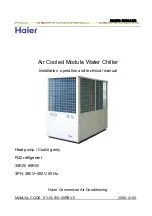
JOHNSON CONTROLS
128
SECTION 7 - OPERATION
Form 201.28-NM1.1
Issue date: 08/06/2021
Low differential oil pressure cutout fault
The Low Differential Oil Pressure Cutout protects the
compressor from low oil flow and insufficient lubrica-
tion. A system will fault and shut down with a controlled
ramped shutdown when it’s differential between oil
and suction pressure falls below the cutout. This safety
ensures that the compressor is pumping sufficiently to
push oil through the oil cooling circuit and through the
internal compressor lubrication system. The following
is the Status display fault message for this safety:
SYS X YYYYYYYY LOW DIFF OIL PRESSURE
The X indicates the system and YYYYYYY indicates
the system is in a “FAULT” condition and will restart
when the 120 second anti-recycle timer times out or
“LOCKOUT” and will not restart until the operator
clears the fault using the keypad.
The safety is ignored for the first 60 seconds of run
time. After the first 60 seconds of operation, the cutout
is linearly ramped from 0 barg to 2.09 barg (0 psid to
30 psid) in 5 to 10 minutes based on ambient tempera-
ture. See the following table for the ramp times for the
given ambient temperatures.
Table 17 -
Low differential oil pressure cutout
Ambient temperature
Ramp time
more than 10°C (50ºF)
5 min
more than 7.2°C (45ºF)
6 min
more than 4.4°C (40ºF)
7 min
more than 1.6°C (35ºF)
8 min
more than 1.1°C (30ºF)
9 min
more than or equal to 1.1°C (30ºF)
10 min
A 30 second safety bypass below 50 Hz is employed
during rampdown. The bypass is primarily needed
under conditions where another compressor is be-
ing brought on and the running compressor is being
ramped down to 5 Hz to add the additional compressor
due to load requirements. Under these conditions, the
slow speed of the running compressors cause the oil
differential to become very low, especially if the water
temperature is high and the suction pressure is high.
The bypass ensures the compressors will not trip on a
nuisance low oil differential fault.
High discharge temperature cutout fault
The High Discharge Temperature Cutout protects the
motor and compressor from overheating. A system
will fault and shut down with a controlled ramped
shutdown when its Discharge Temperature rises above
121°C (250°F). A system will also be inhibited from
starting if the discharge temperature is above 93°C
(200°F). The following is the Status display fault mes-
sage for this safety:
SYS X YYYYYYYY HIGH DISCHARGE TEMP
The X indicates the system and YYYYYYY indicates
the system is in a “FAULT” condition and will restart
when the 120 second anti-recycle timer times out or
“LOCKOUT” and will not restart until the operator
clears the fault using the keypad.
Low discharge superheat cutout fault
The Low Discharge Superheat safety helps protect the
compressor from liquid floodback through the econo-
mizer line due to a high flashtank level. It also helps
protect the compressor from excessive oil in circula-
tion due to excess oil charge in the system. Excessive
oil in circulation brings back liquid refrigerant which
is entrained in the oil. The liquid then drops out once it
enters the compressor.
The safety is ignored for the first 10 minutes of op-
eration if the system economizer feed valve is closed
(0%) and for 5 minutes of operation if the economizer
feed valve is open greater than 0%. If the discharge su-
perheat falls below 2.8°C (5.0°F) for 5 minutes under
either condition, the system will shut down.
The X indicates the system and YYYYYYY indicates
the system is in a “FAULT” condition and will restart
when the 120 second anti-recycle timer times out or
“LOCKOUT” and will not restart until the operator
clears the fault using the keypad.
Discharge pressure load limiting/unloading
Discharge pressure load limiting protects the condens-
er from experiencing dangerously high pressures. A
system is permitted to load normally as long as the dis-
charge pressure is below the High Discharge Pressure
Cutout minus 20 psig. Between Cutout minus 20 psig
and Cutout minus 15 psig loading is inhibited even
though increased loading may be required. Between
Cutout minus 15 psig and the Discharge Pressure Cut-
out, forced unloading is performed every 2 seconds ac-
cording to the following table.
















































